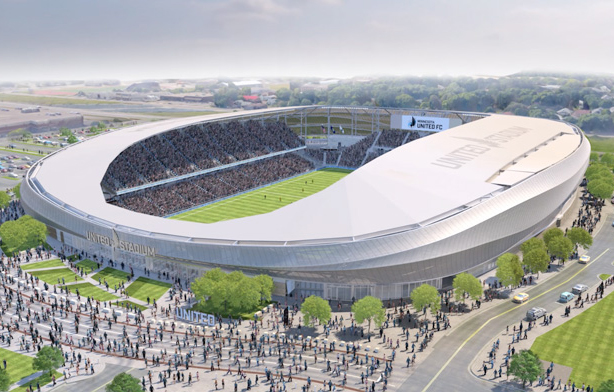Tuesday night, Governor Mark Dayton signed the omnibus tax bill into law as part of a full slate of budget bills passed. The bills were passed in the closing hours of the regular session and in extra time late last week. Aside from $46 billion in funding for all of state government, the tax bill also included two key property tax and sales tax exemptions that will move the Minnesota United Midway soccer stadium construction forward.
The bill-signing marks the end of a winding road that began more than a year ago, when a hastily constructed tax bill passed with a grammatical error that would have cost the state more than $100 million. Though this year’s tax bill carries baggage of its own, the stadium provisions appear to be iron-clad.
After Dayton signed the bill into law Tuesday night, Minnesota United owner Bill McGuire released a statement.
“On behalf of everyone at Minnesota United, we would like to thank Governor Mark Dayton and the Minnesota Legislature for their work in helping to pass this legislation which is vital to our stadium goals.
“We look forward to continuing our efforts to build what we believe will be a world-class soccer specific stadium that will serve our team, our fans and our community, and will make everyone in Minnesota proud.”
Moving, but not moving out
In a session where St. Paul had to fight to protect its ability to set its own labor standards, it may seem surprising to see a St. Paul soccer stadium provision signed into law. It’s likely that Minnesota United’s commitment and long history in Blaine played a crucial role in the process.
The language was originally carried by Representative Tim Sanders, a respected Republican from Blaine. And though he’s no longer in the House, his common sense take likely carried some weight with members of both parties as the bill was introduced and walked through the process last year. The fact that Minnesota United has committed to Blaine long-term — even as they work for a new St. Paul stadium — certainly didn’t hurt, either. It essence, they’re moving, but they’re not moving out.
One of these things is not like the others?
Though Minnesota has dealt with its fair share of stadium fatigue, Minnesota United has consistently sought to sell its Midway stadium as a much better deal for taxpayers. For one, much of the site where the stadium will be constructed has been tax exempt for decades. That doesn’t mean a continued tax-exempt status was a slam dunk, but it has shifted much of the focus to the surrounding site and how a new stadium may serve as a catalyst for new housing and jobs in the core of the metro area.
The fact that the stadium is privately financed and generally less expensive to the tax payers than other recent stadium projects may have helped soothe some of that fatigue. As did the team’s plan to give the stadium to the city and have it publicly-operated – allowing for more access and public use.
And now, we wait
The only thing left to do for the average fan, really, is to wait. Though much of the stadium site itself is already publicly owned, the other portions are going to be fairly complex to redevelop. In the end, the team expects to begin play in their new, permanent home in the 2019 season – about what they expected when they originally broke ground.
FiftyFive.One is now on Patreon. Do you like the independent coverage of soccer news from Minnesota and beyond that FiftyFive.One offers? Please consider becoming a patron.

Leave a Reply